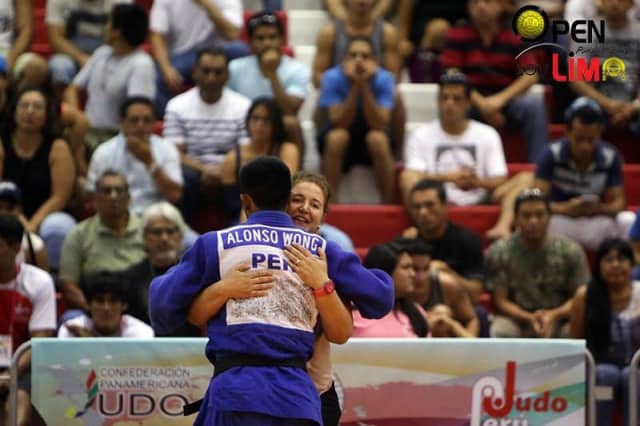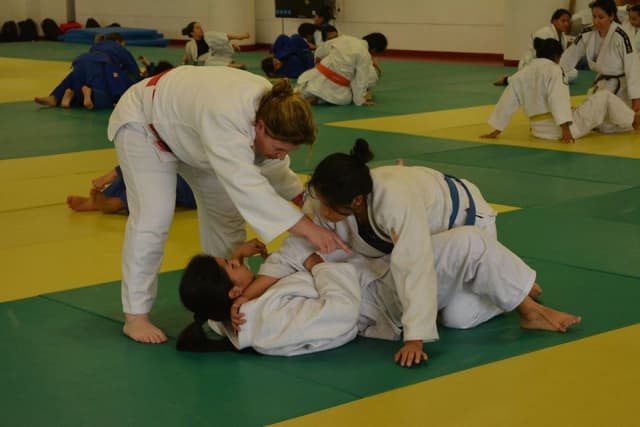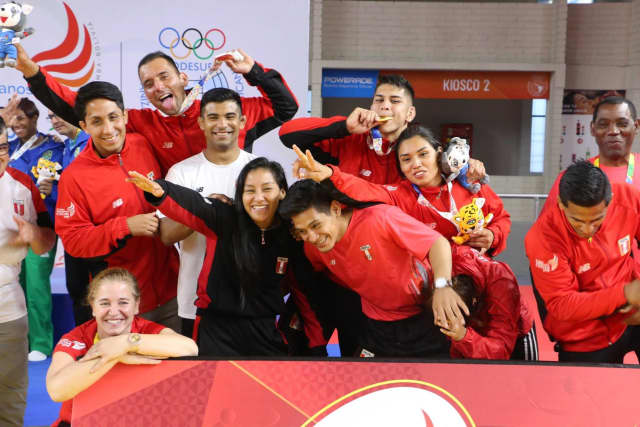- How has nutrition been for you during this time? How did it change?
Normally I would eat away from home; I used to be running from one place to another, because I was always working. In this time of quarantine, my diet has been healthier, in terms of eating at the right time, eating as a family and eating healthier foods. Even eating every day and at normal hours is better as so often I skipped meals because I didn't have time.
- How important is the psychological aspect with regard to keeping judoka focussed in such a difficult period?
Resilience and psychological strength are undoubtedly fundamental qualities needed to cope with this period in the best way. Some of my athletes and coaches have had difficult times due to uncertainty, anxiety and despair, from not knowing exactly what was going to happen, but fortunately all of them have been able to redirect it properly.
-What did you tell them in order to encourage them to keep training and not lose hope?
That in life you always have to be prepared to accept changes, that plans often do not go exactly as we imagined and even that sometimes things we are certain of still change. The things we take for granted and know to be safe, sometimes are not and that this was a situation similar to a competition; that the stress they felt was similar to that which occurs when things do not go well after much work to obtain a result and that a competitor must always be able to get up and continue working in search of the objective. Always look to see what the opportunities are. This pandemic was only a parenthesis and everything will return to normal. It was not in our hands to make the pandemic not exist, it was there, but that it was in our hands to face it in the best way and continue working with clear objectives and not lose our way.
-How about you? What did you tell yourself?
At first I was very worried about how to deal with the situation, but I decided that I could not do anything but continue working and adapt as soon as possible to the new conditions. So many people depended on what I decided, so this helped me to not allow myself to be beaten by fear. I thought about how we could continue, how the athletes trained, how the coaches were in contact with their athletes, that the injuries were monitored and progressed, that they continued to weigh. We ensured the clubs and judokas of Peru continued to have a link with the Federation and we started using digital platforms. We created a programme that we called IPPON AT HOME and everything started to work, although I was always and am still worried about how and when we are going to return to a certain normality. I think there is no other choice but to be optimistic, to think that everything will happen, that all precautions must be taken not to expose any athlete or coach to the possibility of contagion. Decisions must be made, day by day, as new situations arise.
- Are you staying together to train continuously?
The national team lives concentrated in a high performance centre in Lima, called VIDENA. Currently, only a small group is in the centre. The youngest and some athletes who were in their provinces when air traffic was restricted, are at home and follow the training through digital platforms.
- If not together, how do you keep in contact?
The coaches responsible for each category connect with athletes twice a day, to do joint training through digital platforms, in this case by Zoom. The injured continue to rehabilitate their injuries in connection with the physical therapists and the nutritionist reviews the diet through photographs sent to them by the athletes. The technical strategy is maintained via meetings in Zoom too. Every month, all the athletes, together with all the members of the national teams, meet in what we call educational assemblies, which are a contact point for everyone to raise any problem or to talk about what the objectives are, what decisions are being made affecting the team, what's new etc. In fact we have all kept very close despite the distance.
- Personally how do you handle your time now? Is it different? Time at home versus time at work?
It is really very different, because before, between work and travelling, I hardly ever spent time at home and now I'm barely out. Sometimes it is difficult to work at home because I have two small children, 8 and 10 years old and it is difficult to focus on work with as much time as before, but everything has its positive side and despite these complications, it allows me to better reconcile my roles as mother and head coach.
- What is your personal feeling/thought about the global situation and how do you see the future of judo?
I try to be positive and I think that in a while things will return to a kind of normal, but maybe not a total normality. We will return to a point similar to where we were before the pandemic. I have a feeling of concern regarding when we can return to normal training, the competition schedules, what the risks of travelling again may be.
-Have you modified the specific judo techniques used in training for the team at this time?
All training at this time is individual; those who were in the high performance centre have just two weeks ago been able to re-start using the facilities. Their use was restricted and closed for almost 100 days, however now the judoka have the necessary means to train their physical level more towards their old normal way. At this time the biosafety protocols still do not allow training in pairs, which means that we have to make great adaptations in technical training, but the important thing is that we have been able to resume face-to-face training and for athletes who still remain at home, the adaptations we have had to make are even greater.
-What training equipment do you like judoka to use when training alone/in isolation? (Such as Uchi-Komi bands, kettlebells, rowing machine, Bulgarian bag, wobble board, Swiss ball or many others)
We have used in this time all the means that we had at our disposal so that the athletes could continue training towards our objectives. We use all that you name and many others, but it hasn’t been the same for everyone. Some athletes, when they traveled home, thought they would be there for 3 days and then quarantine was declared and land and air transportation were restricted. Those whom have not been able to return to the high performance centre have already been home for more than 100 days. When they travelled, they hardly carried luggage or anything specific to train, since it was a brief visit and some had not even carried judogi, so we had to be really creative and use everything they had to continue making progress. It has undoubtedly been a challenge to reinvent and create from minimums on many occasions.
- Do you think there are some positives to take from this challenging global situation? Which positives apply to you, your life or your work?
I think that like any challenge, it has forced us to get out of our comfort zone and reinvent ourselves and it has reminded us that nothing is certain and that we must be able to adapt and focus on the positive even in the worst case scenario, in order to move forward. It has also reaffirmed for me the importance of working as a team, of supporting each other among those who work for a common goal. I have always been very proud of the team I work with at Judoperu and once again they have shown me that they are willing to work as hard as is necessary, 24/7, to achieve the objectives set, whatever they may be. Despite all the difficulties and most importantly, they always with the best of dispositions and a smile.
- Which judoka really impresses you at the moment and why?
I am impressed at this moment and always by my husband and my boss; the president of the Peruvian Judo Federation, Carlos Zegarra. He has always been willing to fight on and off the mat for what he believes is right, because he is a tireless worker and a dreamer who refuses to believe that something is impossible or that something it is too difficult to reach it. Being with a person who is never willing to accept that something cannot be achieved, someone who won’t settle, never willing to stop, makes us all have to always give our best. Something that always impresses me is that even in the worst moments and with maybe just one word, he is capable of making us all smile and move on.
- If you found Aladdin’s lamp and were granted 3 wishes, what would you wish for?
I would like this virus and any other similar threat to disappear but to leave us understanding the fragility of everything we know and the importance of caring for the planet more. I wish that the values of judo were more present in all societies on the planet and that we really all were more respectful, empathetic and in solidarity with each other and tolerant with our differences. My third wish, a little more selfish perhaps, but a dream that we all work for, would be to achieve an Olympic medal with one of my athletes.



